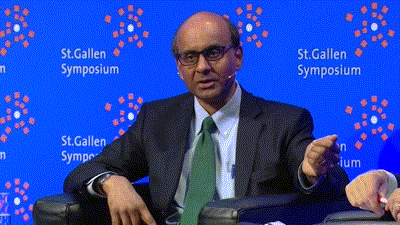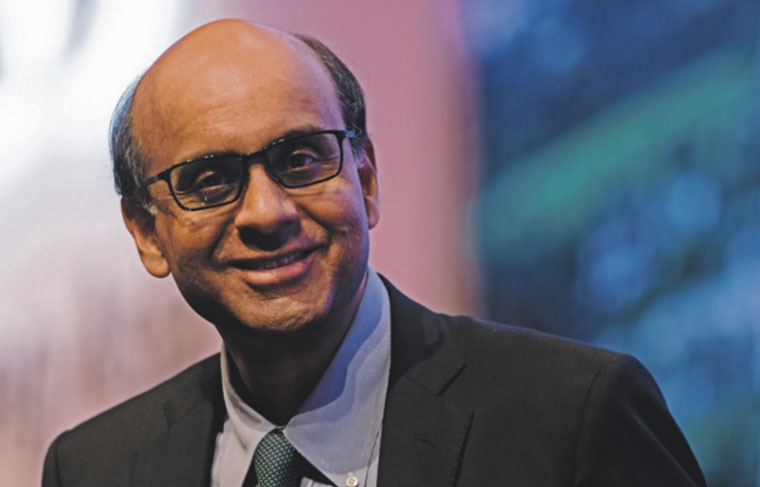For those who have been trying to follow the story of our economic transformation, you can be forgiven if you find yourself lost among an alphabet soup of government acronyms and bureaucratic gobbledygook.
NPC, CSIP, ITMs, CFE, FEC...
Not sure what's all that about?
Enter the man who owned the BBC guy Stephen Sackur almost two years ago, with "the notion of a trampoline" to re-imagine the concept of social safety nets, to help us make sense of it all.

He is no other than the master story teller Deputy Prime Minister and Coordinating Minister for Economic and Social Policies Tharman Shanmugaratnam, who has shown everyone in the government once again, how to crystallize abstract ideas using interesting and concrete examples.
The Fosbury Flop
In an interview with the Labour Movement’s weekly publication, NTUC This Week, Tharman who was a sports mad athlete in his Anglo-Chinese School (ACS) days aptly used a sporting analogy - "The Fosbury Flop" in high jump to describe why innovation is necessary to transform our economy.
Here is how he told the story of disruption and constant improvement:
Part 1: Entrenched methods
"For a long time - in fact well over a century – there were two main techniques in the high jump. It was
either the ‘scissor’ or the ‘straddle’, and both involved one leg leading the rest of your body over the bar."
 The Scissor
The Scissor
 The Straddle
The Straddle
Part 2: Disruption of old methods
"Then at the 1968 Olympics in Mexico City, a young man called Dick Fosbury came along and shocked the world. He ran in curving loop towards the bar before leaping backwards, head first, with his legs coming over last. He broke the Olympic record by a stunning 6 cm with that backward leap. It was new, it was bizarre,
and it took a few years for the “Fosbury Flop” to become popular."
 The Fosbury Flop
The Fosbury Flop
Part 3: Adoption of new methods and refinement
"But by the mid-70s, every serious international jumper was doing the Flop, and the scissor and straddle
disappeared. Dick Fosbury himself faded from the scene quickly, but other athletes kept refining the Flop and improving on it, so in the next 30 years, the record went up further by 15 cm."
Moving beyond a "two-speed economy"
That is not all from the master of figurative language.
Tharman also offered another way to think about the state of our economy. He described the current economy as "running at two different speeds on two tracks", where deepening of skills and innovation will be critical to meet the "basic economic challenge" of sustaining income growth for the average worker, and for our lower-income workers.
And this is what Singapore intends to achieve through the SkillsFuture programme, the Industry Transformation Maps (ITMs), and the other directions coming out of the Committee for the Future Economy (CFE).
Hence, for Tharman who "love watching athletes", there are clear lessons to learn from the "Fosbury Flop":
"What it amounts to is the need for bold, disruptive changes, introduced by firms that want to transform industries. But we also need more of the copying, tweaking and improving by other firms, so that each new innovation isn’t just a big leap forward for one firm or one cluster of firms, but spreads throughout the industry. So we need both things – the bold breakthroughs as well as the constant copying and tweaking that spreads change throughout an economy."
"So the Fosbury Flop is a story of a sudden leap that disrupted the game, making old techniques redundant, and everyone then copying and improving it and taking the record even higher. That’s how it must be in the economy, and especially in the industries that have been stuck in low gear. We have to allow and encourage disruptive change. There’s clearly scope for it."
May Day Awards Highest Honour
On May 13, the National Trades Union Congress (NTUC) conferred the Medal of Honour - the highest award for May Day Awards in 2017, on Tharman for his distinguished services to the Labour Movement.
Over the years, he had helmed the SkillsFuture Council, National Productivity Council (NPC) and subsequently, the Council for Skills, Innovation and Productivity (CSIP), which has been recently renamed the Future Economy Council (FEC) to be led by Finance Minister Heng Swee Keat.
If you like what you read, follow us on Facebook and Twitter to get the latest updates.
If you like what you read, follow us on Facebook, Instagram, Twitter and Telegram to get the latest updates.
